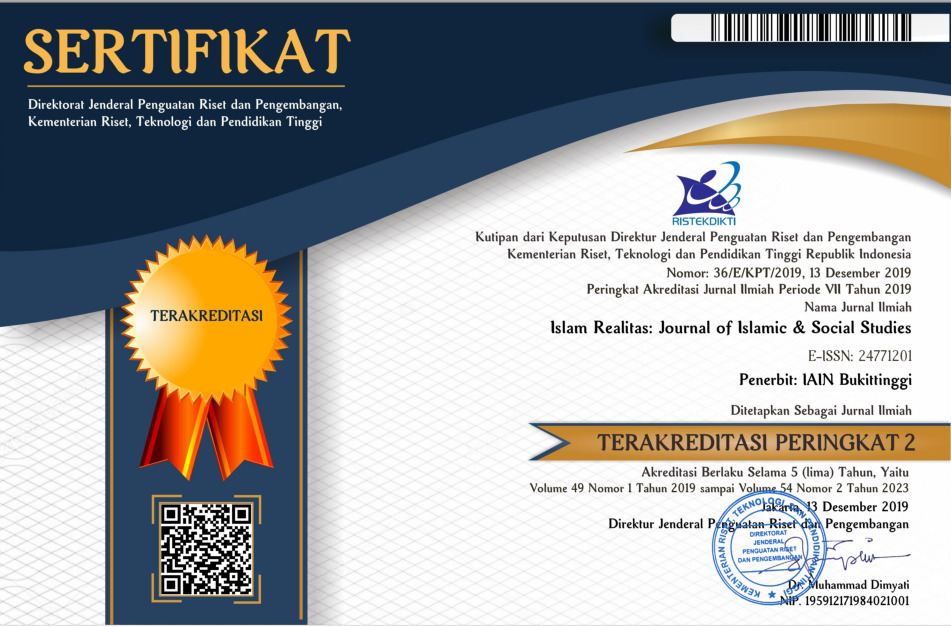Symbiosis Identity: Islam, Culture (Urf) and Social Mobilization in Indonesia
DOI:
https://doi.org/10.30983/fuaduna.v6i2.5808Keywords:
Social Identity, Ethnicity, Islamic Culture, Social Mobilization, Nationalism.Abstract
This article demonstrates that the extraction of Islamic value must be coped with social mobilization in the current situation. Voicing the importance of Islamic identity is to deal with the threat of global identity due to preserving the normative value. This article proposes that Islamic identity as the ultimate instrument to face the current challenges. Islamic Identity took a special code for anyone to insert oneself involved reality. Contrary with the assumed concept of globalism that could dismantle the traditional relation symbols amid the ethnicity is perceived as the stabilizer of social disruption in digital era. Recently, ethnicity gets the limelight due the globalism to strengthen the cohesive traditional connection to emerge showy. This article brings proven evidence to show a strong relations of ethnicity with nationality and religious values, which defend the establishment of the social order in nations such as Indonesia. Furthermore, this article found that the recent phenomena within the democracy system is to intake the dominant ethnic as the patron in politics, society, or religion. However, it is harnessed as potential threat to minorities’ identity in many fields.
References
A-SI, Arikewuyo. “Contextualizing the Legacy of the Prophet Muhammad on Religious Tolerance for Peaceful Co-Existence in a Multi-Faith Society.†Islamic Quarterly 59, no. (2) (2015): 215–36.
A, Sitasari. “Explaining Individual Level Support for Women in Government in Indonesia: Beyond Demographics and Ethnicity.†In Annual Meeting 2006. Conference Papers -- American Political Science Association, 2006.
Abdullah, Taufik. “II. Islam and the Formation of Tradition in Indonesia: A Comparative Perspective.†Itinerario 13, no. 1 (March 22, 1989): 17–36. https://doi.org/10.1017/S0165115300004137.
Adam D. Tyson. Reviewed Work: Decentralization and Adat Revivalism in Indonesia: The Politics of Becoming Indigenous. Routledge. London and New York: Routledge, 2010. https://doi.org/10.5728/indonesia.92.0199.
Ali-Karamali, Sumbul. “Demystifying Shariah: What It Is, How It Works, and Why It’s Not Taking Over Our Country.†Library Journal 145, no. 4 (2020): 111.
Asmin, Ferdinal, Dudung Darusman, Iin Ichwandi, and Didik Suharjito. “Social Capital of Parak and Rimbo Management in West Sumatra.†Jurnal Manajemen Hutan Tropika 23, no. 3 SE-Articles (December 31, 2017): 140–49. https://journal.ipb.ac.id/index.php/jmht/article/view/19672.
Auda, Jasser. “A MaqÄsidÄ« Approach to Contemporary Application of the Sharī’ah.†Intellectual Discourse 19, no. 2 (2011): 193–217.
Dennis, Jeremy K. “The Kantian Effect: Reconceiving the Integration of Knowledge in Interdisciplinary Theory.†JIS Journal of Interdisciplinary Sciences 4, no. 2 (2020): 1–14. www.journalofinterdisciplinarysciences.com.
French, Doran C., Urip Purwono, and Airin Triwahyuni. “Friendship and the Religiosity of Indonesian Muslim Adolescents.†Journal of Youth and Adolescence 40, no. 12 (December 11, 2011): 1623–33. https://doi.org/10.1007/s10964-011-9645-7.
Henie, Mimien, Irawati Al Muhdhar, Fatchur Rohman, M Nasir Tamalene, Wawan S Nadra, Alfian Daud, and Hudan Irsyadi. “International Journal of Conservation Science Local Wisdom-Based Conservation Ethics of Tabaru Traditional Community on Halmahera Island, Indonesia.†International Journal of Conservation Science 10, no. 3 (2019): 533–42. www.ijcs.uaic.ro.
Khan, Hussain Ahmad. “‘The People of My Generation Are Best ’: Conceptualizing Testimony in Early Islam (9th and 10 Th Centuries).†Journal of Social Sciences and Humanities 23, no. 1 (2015).
Kozitsin, Ivan V. “Opinion Dynamics of Online Social Network Users: A Micro-Level Analysis.†The Journal of Mathematical Sociology 47, no. 1 (January 2, 2023): 1–41. https://doi.org/10.1080/0022250X.2021.1956917.
Lubis, Ilham, and Anni Rahimah. “Angkola Language Acquisition among the Children: A Psychological Study.†International Humanities Studies 6, no. (2) (2019): 12–26.
Lukito, Ratno. “Mapping the Relationship of Competing Legal Traditions in the Era of Transnationalism in Indonesia. In: Pluralism, Transnationalism, and Culture in Asian Law : A Book in Honour of M.B. Hooker,†90–115. Singapore: ISEAS Publishing, 2017.
Rehm, Martin, Sara Moukarzel, Alan J. Daly, and Miguel Fresno. “Exploring Online Social Networks of School Leaders in Times of COVIDâ€19.†British Journal of Educational Technology 52, no. 4 (July 7, 2021): 1414–33. https://doi.org/10.1111/bjet.13099.
Rodgers, Susan. “Islam and the Changing of Social and Cultural Structures in the Angkola Batak Homeland.†Social Compass 31, no. 1 (February 16, 1984): 57–74. https://doi.org/10.1177/003776868403100103.
Roslan Mohd Nor, Mohd, and Maksum Malim. “Revisiting Islamic Education: The Case of Indonesia.†Journal for Multicultural Education 8, no. 4 (November 4, 2014): 261–76. https://doi.org/10.1108/JME-05-2014-0019.
Santoso, Didik Haryadi, Jamaluddin Aziz, Pawito -, Prahastiwi Utari, and Drajat Tri Kartono. “Populism in New Media: The Online Presidential Campaign Discourse in Indonesia.†GEMA Online® Journal of Language Studies 20, no. 2 (May 22, 2020): 115–32. https://doi.org/10.17576/gema-2020-2002-07.
Shabana, Ayman. “’Urf and ’Adah within the Framework of Al-Shatibi’s Legal Methodology.†UCLA Journal of Islamic & Near Eastern Law 6, no. (1) (2007): 87–100.
Whewell, Emma, Helen Caldwell, Grant Malloch, and Beth Garrett. “Digital Learning Across Boundaries: Immersive Technologies Supporting Changemaking in an International Context.†Research in Education and Learning Innovation Archives, no. 27 (July 15, 2021): 19. https://doi.org/10.7203/realia.27.18019.
Wibowo, Nicholas Jonathan Hendrik. “Communicating Identity in LinkedIn from Indonesian Cultural Perspective.†K@ta 21, no. 2 (2019): 51–59. https://doi.org/https://doi.org/10.9744/kata.21.2.51-59.
Zikri, Irfan. “Social Transformation and the Change of Community Capacity of Post-Tsunami Aceh, Indonesia.†Pertanika Journal of Social Sciences and Humanities 25, no. (3) (2017): 1297–1318. http://www.pertanika.upm.edu.my/pjssh/browse/regular-issue?decade=2020&year=2017&journal=JSSH-25-3-9.
Downloads
Published
How to Cite
Issue
Section
Citation Check
License
Copyright (c) 2022 Muhammad Habibi Siregar and Yuldashev Mansurjon Alijanovich

This work is licensed under a Creative Commons Attribution-ShareAlike 4.0 International License.
Authors who publish with this journal agree to the following terms:
- Authors retain copyright and grant the journal right of first publication with the work simultaneously licensed under a Creative Commons Attribution-ShareAlike 4.0. that allows others to share the work with an acknowledgment of the work's authorship and initial publication in this journal.
- Authors are able to enter into separate, additional contractual arrangements for the non-exclusive distribution of the journal's published version of the work (e.g., post it to an institutional repository or publish it in a book), with an acknowledgment of its initial publication in this journal.
- Authors are permitted and encouraged to post their work online (e.g., in institutional repositories or on their website) prior to and during the submission process, as it can lead to productive exchanges, as well as earlier and greater citation of published work (See The Effect of Open Access).





